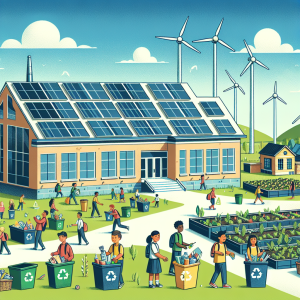How to Educate Children About the Importance of Recycling
Educating children about the importance of recycling is a fundamental step in fostering a sustainable future. To engage young learners effectively, educators, parents, and communities can implement a variety of strategies tailored to different ages and learning styles. Incorporating practical activities, interactive tools, and relatable examples can significantly boost a child’s understanding and commitment to recycling. Here’s a comprehensive guide that explores different aspects for teaching children the importance of recycling.
Understanding the Basics: Simplify the Concept of Recycling
Begin by breaking down the concept of recycling into simple, understandable terms. Explain what recycling is and why it is crucial, using age-appropriate language. Young children can grasp the basic idea of converting waste into reusable material when explained through relatable everyday examples. For instance, you might say, “Recycling means turning our old things, like paper and bottles, into new things so that we can use them again instead of throwing them away.”
Create a Recycling Routine at Home
One of the most effective ways to instill the habit of recycling is by creating a systematic recycling routine at home. Set up designated bins for different types of waste such as paper, plastics, glass, and compostable materials. Encourage children to participate by making it a daily task to sort waste into these bins. Reinforce this activity with positive reinforcement to create lasting habits. Parents can also introduce a reward system for consistent participation to boost motivation.
Use Educational Media
Utilize books, cartoons, and online videos that focus on recycling themes to capture children’s interest. Many educational shows and resources, available both online and offline, provide entertaining narratives while also teaching about environmental responsibility. Titles like “The Lorax” by Dr. Seuss and educational platforms like Sesame Street have environmental episodes that can effectively communicate the importance of recycling through captivating storylines and characters children relate to.
Engage in Creative Activities
Art projects using recyclable materials are an excellent way to teach children about recycling. Engage them in activities like creating collages from old magazines, constructing models from cardboard boxes, or assembling crafts from plastic bottles. Such hands-on experiences can drive home the message that items often deemed as waste can be creatively repurposed. Additionally, these projects enhance problem-solving skills and creativity among young learners.
Take Educational Field Trips
Organizing trips to recycling centers or waste management facilities can provide children with a firsthand look at the recycling process. Witnessing the operations at these facilities can demystify the process and highlight the importance of sorting and processing waste. It also helps children understand the impact of their recycling efforts in a broader environmental context. Some recycling centers offer guided tours specifically designed for school groups and young visitors, making it an educational and memorable experience.
Incorporate Technology and Games
In today’s digital age, educational apps and games related to recycling can be an engaging way for children to learn. Interactive games that involve sorting recyclables or managing waste in a virtual city can teach children the principles of recycling in a fun and interactive manner. Apps like “Recycle Roundup” are designed to improve children’s recycling skills and knowledge through play. These tools can cater to various age groups and provide adaptive learning opportunities.
Implement School Recycling Programs
Schools play a vital role in educating children about recycling. Implementing a school-wide recycling program can have a significant impact. Schools can set up recycling bins in classrooms and common areas, encouraging students to dispose of waste responsibly. Integrating recycling education into the curriculum, such as during science or environmental studies lessons, can also enhance students’ understanding. Schools may even organize recycling contests or projects that motivate students to participate actively.
Set Up Community Involvement Initiatives
Involving children in community-based recycling initiatives can expand their understanding of recycling beyond home and school. Participate in or organize community clean-up events where families work together to clean local parks or beaches. Such activities not only teach children about the importance of maintaining clean environments but also foster a sense of community responsibility and civic pride. Additionally, children can see firsthand the positive effects their actions have on their local surroundings.
Teach the Environmental Impact
Communicate the environmental benefits of recycling, such as reduced pollution, conservation of resources, and energy savings, in a straightforward manner. Relate these benefits to tangible outcomes like cleaner air, preservation of wildlife habitats, and reduced landfill sizes. Visual aids such as charts showing the lifecycle of products and the benefits of recycling can aid in comprehension. These lessons can be reinforced with real-world statistics and current events related to environmental conservation.
Be a Role Model
Children learn by example. Demonstrating responsible recycling habits and discussing personal experiences with recycling can be very influential. Parents, teachers, and community leaders setting an example by actively participating in recycling efforts underscore the importance of these actions. Sharing stories about how recycling has personally impacted them or improved the environment can connect children to the cause on a personal level.
Cultivate Environmental Advocacy
Encourage children to become advocates for recycling within their communities. This could involve sharing what they’ve learned with friends and family, partaking in recycling challenges, or even starting a recycling campaign at school or on social media platforms. Empowering children to take initiative not only bolsters their commitment to environmental causes but also builds leadership skills.
By employing a multifaceted approach that includes practical, digital, and community-oriented tools, educating children about recycling becomes an enriching and impactful endeavor. These strategies promise to develop knowledgeable, environmentally-conscious citizens ready to lead the way towards a more sustainable world.



